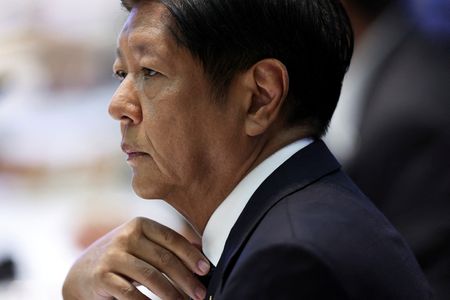BEIJING (Reuters) -A small town in China’s Henan was lashed by almost a year’s worth of rain in one day as the extreme storms that battered the south this summer shift to the central and northern provinces.
As of 8 a.m. (0000 GMT) on Tuesday, 606.7mm (24 inches) of rainfall had been logged in Dafengying over a 24 hour-period, the most anywhere in China, according to national weather forecasters.
That compares with the average annual rainfall of 800mm in the area.
Dafengying lies within the city limits of Nanyang, which is renowned for its mild and temperate weather.
Authorities in central Henan province put in place the most severe flood control measures for the city early on Tuesday.
Record rainfall had pounded southern China in April to June, while in the north, dry weather parched fields and threatened crops. As the summer advanced, the seasonal rain belt swung north, drenching provinces that grappled with drought-like conditions just a month ago.
The vast region where Henan, Shandong and Anhui provinces meet will see particularly heavy rainfall through late Tuesday, according to forecasts.
Early on Tuesday, Beijing temporarily shut numerous train lines in suburban areas after issuing an early warning for thunderstorms and flash floods.
Authorities have also placed the northern region on high alert for heavy rains since late Monday and agencies have taken measures to counter the impact of heavy rainfall.
In China’s northwestern province of Gansu, Kang county flagged a red alert for rain and warnings of mountain torrents and urban flooding.
A resurgence of floodwater along the middle and lower reaches of the Yangtze, China’s longest river, has also pushed its drainage basin into a critical period of flood control on Tuesday, Xinhua said.
Authorities have been monitoring and adjusting water discharge from the Three Gorges Dam, which sits on the Yangtze, to help reduce the flood control pressures in Hubei, Hunan, Jiangxi and other provinces in the middle and lower reaches of the river.
(Reporting by Liz Lee, Albee Zhang and Ryan Woo; Editing by Christian Schmollinger and Miral Fahmy)








